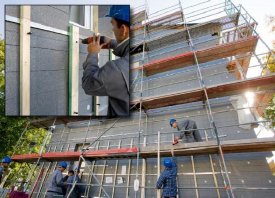Jan 11 2011
Two building projects in Ludwigshafen and Erfurt, Germany now show how the back-ventilated curtain façade with insulation panels made of BASF's Neopor® (EPS: expandable polystyrene) can be used in renovation and new buildings. A 1950s apartment house and a new office building there have been fitted with the patented swisspor Lambda Vento façade system.
The system, produced by the Swiss insulation material manufacturer swisspor and approved by the Deutsches Institut für Bautechnik, Germany, offers very good thermal insulation (λR = 0.032 W/m*K) and considerable design freedom for individual, high-quality and at the same time weather-resistant façades.
LUWOGE, the real-estate company of BASF has renovated the façade of a 1950s three-story apartment house with twelve apartments in Ludwigshafen am Rhein. The façade was lined with gray fiber cement panels. The multi-layer outer wall construction – consisting of insulation panels, wooden sub-structure with an air gap and external cladding – is impervious to moisture and therefore dimensionally stable, resistant to ageing and rot-proof. The insulation panels made of Neopor have a tongue and groove all the way round, and with the spacer bolts, that are placed at regular points and that fix the sub-structure, form a construction that is virtually free of thermal bridges.

The building project at Erfurt is a new office building for the Evangelisches Kirchenamt Mitteldeutschland which is rebuilding and extending parts of the old university in the old town center. The new building will have a façade with fiber cement panels. A considerable advantage in the narrow streets with very little room for building: the multilayer outer wall construction is compact and space-saving. It can also be assembled simply, reliably and quickly. The insulation panels, which are approved at thicknesses of up to 200 mm, are cut without any dust or waste using a hot wire cutting device. They are easily secured to the sub-structure with insulation material holders known as insulation anchors and so do not have to be glued. This means that the panels can be mounted virtually all year round regardless of weather conditions. The façade can be completely dismantled if necessary and all components can be reused or recycled.
Swisspor's Lambda Vento façade system has been approved for fire safety by the Deutsches Institut für Bautechnik. According to the respective state building regulations, the system can also be used for buildings in classes 4 and 5 (flame-retardant) up to high-rise level because the fire protection prescribed there is provided by fire locks and fire barriers installed on every floor. For building classes 1 to 3, the system can be used irrespective of the thickness of the insulation material and without any additional fire precautions.
Insulation material for energy-efficient applications
Neopor is an advanced version of the classic white insulation material Styropor®. BASF manufactures the black expandable granules from polystyrene. Converters foam the granules and process them into foam blocks and molded parts for various applications, particularly for insulating buildings. Insulation materials made of Neopor are silver-gray because it contains finely-dispersed graphite particles which reflect the thermal radiation like tiny mirrors and thus reduce heat losses in the house. Thus, the insulation performance is increased by up to 20%. This saves heating costs and enhances the value of buildings in an environmentally friendly way.